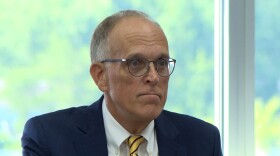Indiana’s Commission for Higher Education is facing a tough reality.
Its research shows most Hoosiers want to go to college, but just over half of high schoolers enrolled. At a July meeting, Commissioner Chris Lowery said he’s found one reason for that gap.
“They lack that career coaching and navigation experience,” Lowery said. “They're not sure what to do.”
The commission and Indiana’s leaders want to align higher education with careers. But Lowery said there’s still another problem: the number of degree programs leave students overwhelmed.
“This degree program review process is an excellent complement to that, to helping students have clear choices and understanding what those are,” Lowery said. “So that we can continue to drive better outcomes for students, employers in Indiana.”
Starting in July, state colleges and universities had to request approval to continue degrees that don’t meet thresholds set by legislators. That would include 15 graduates for a bachelor's degree, and seven for a master’s degree.
Before the law passed, the commission alerted colleges and provided a list of programs that would not meet thresholds. Six of Indiana’s public higher education institutions volunteered to make the changes before July.
More than 400 programs will be changed next year. It will impact about 4 percent of graduates in Indiana, or 3,300 each year.
“These are zero — zero — to low, very low enrollment completion programs, but they're out there as choices today,” Lowery said.
Vincennes University did not participate.

One-hundred-and one programs will be suspended. These will slowly fade away through a teach-out process.
Seventy-four will be outright eliminated. Almost all of those programs had no students involved.
Most programs, 229, will be merged or consolidated. Merged programs will be absorbed by an existing program, and consolidated programs will combine to create a new one.
“Suspended, merged, and consolidated programs will require an orderly teach out, enabling the currently enrolled students to complete their original program of study, or they can transfer to the newly consolidated one, where they can change their majors entirely if they choose,” said Matt Butler, the commission’s chief academic officer.
Many of these programs also offer minors or concentrations, and Butler said those will probably stay.
Some colleges, such as Indiana University, made plans to give faculty more input, Butler said.
“They are using a two-step process of suspend, then merge and consolidate,” Butler said. “And therefore, in this opportunity they are committing, ‘we will merge and consolidate, X, Y and Z degrees down the line.’”
IU spokespeople said affected staff and faculty will learn more in the coming year.
Colleges can continue some programs as they are even if they don’t meet the minimum number of graduates. That exception comes with more work. They need to prove to the commission those degrees are valuable, align with the workforce and show they lead to positive outcomes.
Newer programs and high-need degrees will be given more leeway, Butler said.
“The institution will be able to make a case, an evidence-based argument, to keep that going,” Butler said.
Commission member Dennis Bland said the commission needs to balance working with colleges and students to make sure degrees are tied to opportunity. Bland said these considerations should be nuanced.
“From a graduation standpoint, there are degrees that have very low volumes, but that are critical in certain industry fields and certain applications,” Bland said.
Affected students should be allowed to finish their degrees. Some colleges and universities have already informed students of the changes. Commission member Kathy Cabello praised the communication for some institutions, saying students are being kept informed.
“They already know my degree’s safe, it’s been moved here, or etc.,” Cabello said.

Higher education institutions have to cut programs’ costs. That part of the law has left faculty and staff afraid, confused and angry. But the commission isn’t sure about that impact, because Butler said staffing changes aren’t reported to the commission.
Most of these changes will take full effect next year, Butler said, unless an institution decides it’s part of a routine review.
“Some of the routine staff actions for programs, like the eliminations, that could happen quickly. Or suspensions, that could happen quickly,” Butler said. “The institution will take it off their application process for next year.”
Lowery said specific changes and cuts depend on the school. But he does believe there will be a closer connection to career advising and better organization.
“But hopefully for the student, she or he is still going to be able to get a degree that then allows them to have expertise or some level of expertise in that field,” Lowery said.






